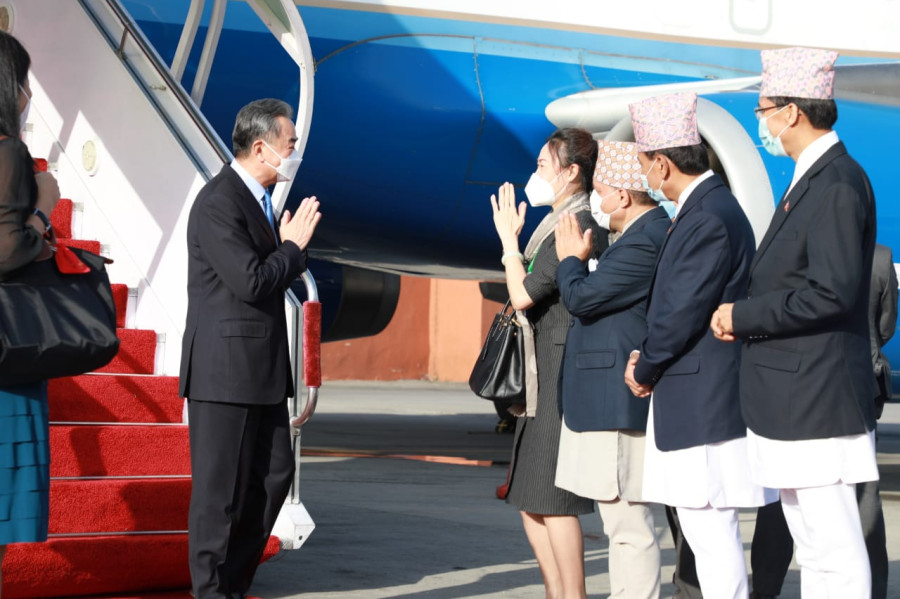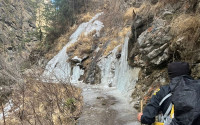National
Wang visit an opportunity for Nepal, China to make amends
Observers say it’s time to rise above boilerplate statements and work jointly towards removing irritants and fixing what’s broken for enhanced cooperation.
Anil Giri
Chinese Foreign Minister Wang Yi arrived in Kathmandu on Friday after a whirlwind tour of South Asia, starting from Pakistan then Afghanistan and India.
At least 10 agreements are likely to be signed during Wang’s three-day stay in Kathmandu, officials have said.
This is the highest level visit by a Chinese delegation since Prime Minister Sher Bahadur Deuba assumed office in July last year. The visit also comes amid geopolitical flux as well as emergence of some irritants in Nepal-China ties in recent times, especially in the wake of Kathmandu’s ratification of a $500 million American grant.
Observers say Wang’s visit to Nepal could not have come at a more appropriate time than now, as both Beijing and Kathmandu have the opportunity to make amends and clear several outstanding issues. Both Nepal and China need to rise above the boilerplate statement that they are all-weather and trouble-free friends and both should work jointly to fix the fractures in ties.
“Let's start out by acknowledging that Nepal and China have a number of outstanding issues,” says Akhilesh Upadhyay, senior research fellow looking after strategic affairs at IIDS, a Kathmandu-based think tank. “Nepali students enrolled in Chinese universities are stranded in Nepal for nearly two years; China's closure of border checkpoints has badly hit the bilateral trade and made Nepali businesses and industries suffer.”
China has continued to enforce strict Covid protocol, closing its borders and all international flights. As a result, the students pursuing higher education who were evacuated from various Chinese cities are still in Nepal and demanding arrangements so that they can return and resume their classes.
Again, on the pretext of Covid, China has kept border points tight, due to which cargo trucks from the north have slowed to a crawl, while Nepal has not been able to export anything to the northern neighbour.
And despite Nepal signing up to the Belt and Road initiative in May 2017, four months before Nepal signed the MCC agreement, not even a single project has taken off under the Chinese initiative. There is no clarity on projects under the BRI, with officials saying there is little likelihood.
Nonetheless, the Chinese side appears to be in a mood to push some projects under the BRI in the wake of ratification of the MCC compact by Nepal, which Beijing sees as an American move to counterbalance Chinese President Xi Jinping’s flagship plan to build infrastructure across Asia and Europe.
“There has been little progress on the BRI, although Nepal signed the framework agreement in 2017 amid a lot of fanfare,” says Upadhyay. “While Nepal does need large scale investments to fund its infrastructure plans, Nepal should let China know why it prefers grant assistance, as against loans.”
Nepal’s tilt towards the north increased in the aftermath of the 2015 Indian blockade. The northern neighbour welcomed Nepal’s requests with open arms. A slew of agreements were signed between China and Nepal in 2016 , including on allowing Nepal to access seven land and sea ports for its third country trade, a move that would have reduced the landlocked country’s dependence on India. However, there too has been little progress.
Over the years, Beijing instead took more interest in Nepal’s internal affairs, including politics, which experts say a miscalculation, or a clear lack of understanding about Nepali polity for that matter.
When the Nepal Communist Party (NCP), a unified communist force born out of merger between the CPN-UML and CPN (Maoist Centre), was on the verge of unravelling, Chinese Ambassador Hou Yanqi made spectacular rounds of Nepali politicians, in what many dubbed the dragon’s unwarranted meddling in Nepal.
The NCP, however, fell apart—much to the north’s chagrin. When the Maoist Centre and a splinter of the UML, CPN (Unified Socialist), played hardball to stop MCC compact’s ratification, some leaders of the Communist Party of China were in constant touch with Nepali communist leaders, holding video conferences with Pushpa Kama Dahal and Madhav Kumar Nepal, chairs of the the Maoist Centre and the newly formed Unified Socialist.
Initially, Beijing had not opposed the MCC compact, but as the Deuba government made a push for its passage, it upped the ante, first by warning the US against “coercive diplomacy” and the second time by terming the American grant a Pandora’s box.
China’s hardened position raised quite an eyebrow in Nepal. The Ministry of Foreign Affairs released a customary statement, but there has not been much debate on what made an otherwise quiet Beijing take such a strong stance and why it amounted to interference in Nepal’s internal affairs.
Warning against the passage of the American grant, according to observers, also was tantamount to undermining Nepali leadership’s sovereign decision-making capacity.
“There may be some misperceptions or a narrowly analysed perspective on the Chinese side regarding the US role in Nepal,” says Bhaskar Koirala who is doing his PhD at Peking University. “And as far as the MCC is concerned, the US has historically seen its role in Nepal as providing a stabilising role vis-a-vis the sometimes overbearing role of Nepal's two gigantic neighbours.”
The $500 million grant from the US is meant for building electricity transmission lines and improving roads. Some communist leaders, however, made it an issue, spreading rumours that the grant compact had security components. Beijing took it more seriously than ever.
Observers say if Beijing has security interests vis-a-vis the MCC compact, the Nepali leadership must be able to make the visiting delegation understand that Nepal’s sole purpose is to garner development support and assure them that Nepal attaches high importance to friendly countries’ security concerns.
“One simple way China and Nepal could keep our relations smooth and make them even stronger is by first acknowledging that each of us will have our national interest at heart,” says Upadhyay. “The simple mantra is: listen to each other's concerns very carefully—and honestly.”
Nepali politicians, however, have been a milquetoast when it comes to its neighbours, afraid of speaking their mind.
Sandwiched between two giant economies, Nepal finds itself in a parlous state, but many say the same positioning can be of a great advantage for the country should Kathmandu play its cards right.
But instead, Nepali politicians have been selective; they tend to play one country against the other, thereby inflicting harm on Nepal and its ties with friendly nations.
Observers say both Beijing and Kathmandu have made a fair share of blunders on their parts in the recent past, so it is a good time to make amends and take the ties forward.
“Beijing made a mistake by making a series of unnecessary, undiplomatic and hostile comments on the MCC compact, which is a bilateral issue between Nepal and the US. In fact, it is not only a bilateral issue, it is an internal matter of Nepal,” said Geja Sharma Wagle, an analyst on strategic and foreign affairs. “Likewise, Nepal also should be very sensitive and balanced when it comes to dealing with China and the US, taking into consideration their geopolitical and strategic interests. Nepal cannot afford to undermine even inadvertently their geopolitical and strategic interests.”
The US has been Nepal’s one of the biggest development partners for 75 years, while India and China are its immediate neighbours and Kathmandu can’t do away with them.
However, there’s this own rivalry among them—between the US and China, and between India and China.
The Russian invasion of Ukraine has further created confusion. While the US and its allies have made efforts to isolate Moscow, Beijing and Delhi have taken a different stance, firmly standing by Vladimir Putin, the Russian president.
Nepal this time has taken a strikingly different position than that of India and China, coming out clearly to oppose the Russian attack on Ukraine, something both Beijing and Delhi might gripe about.
Wang’s “unannounced” visit to India also doesn’t seem to have gone down well. Ahead of his visit, Wang received rebuke from Delhi over his statement on Jammu and Kashmir. Wang’s visit marked the first high-level visit from China since the Galwan clash two years ago.
Wang on Friday met with Indian National Security Adviser Ajit Doval and Foreign Minister S Jaishankar.
According to Reuters, Delhi maintained that ties with China could not be normal until their troops pulled back from each other on the disputed border, even as Wang tried to strike a conciliatory note.
The US-China and India-China rivalries pose a big challenge for Nepal to steer clear of geopolitical games.
Observers say what Nepal needs to learn is to find ways to make the most of its relations with its friendly nations by avoiding the risk of falling into geopolitical games.
“Nepal should follow an independent foreign policy ensuring diplomatic balance that is the fundamental guiding principle of Nepal,” says Wagle.
As far as Nepal-China ties are concerned, according to Wagle, there clearly is some trust deficit between Kathmandu and Beijing.
“It’s high time both bridged the gap and took their long-standing ties to a new height based on mutual respect for each other’s sovereignty, non-interference, non-aggression, mutual benefit and the principle of sovereign equality,” says Wagle. “In particular, Nepal should seize this visit as an opportunity by offering a diplomatic olive branch to Beijing to bridge the trust and diplomatic deficit.”
Beijing’s security concerns have roots not only in the MCC compact and America’s Indo-Pacific strategy or Nepal’s closeness with India, given the 1,800-km long porous border Nepal shares with the southern neighbour.
Thousands of Tibetans who fled the failed 1959 Tibetan uprising live in Nepal. Kathmandu has for long, to reassert the One-China policy, cracks down on them during the Dalai Lama’s birth celebrations.
The government has issued a notice to Tibetan refugees to not organise any gatherings in view of Wang’s visit, which a Tibetan refugee organisation has duly obliged to.
On Friday, the Tibetan Settlement Office of Kathmandu and Swayambhu issued a notice, a copy of which the Post has obtained, requesting the Tibetans to refrain from holding any public gatherings and restrict the mobility to “avoid any arrest during the time of Wang’s visit.”
There has been little debate on Tibetans and issues related to them among Nepali political and civil society circles, in an indication of Nepal’s confused mindset with regards to dealing with the north.
As far as Beijing’s security concerns are concerned, observers say Kathmandu must be able to talk and make a clear position on how it can assure—and in what matter—it won’t let its neighbour down, rather than making routine statements like “Nepal won’t allow its soil to be used against a friendly nation.”
According to observers, it’s incumbent upon Nepali political actors how to win the confidence of Nepal’s friendly nations—be it China, India and the US, or any other friendly nation.
“It may not be the most obvious conclusion for Beijing to draw that the US role in Nepal is not always inimical to its interests; in fact there may be times at which the US Nepal relationship is in fact consistent with some of China’s goals as far as the South Asian region is concerned,” says Koirala, who is also the director of Nepal Institute of International and Strategic Studies.
“For instance, how can the MCC’s objective of enhancing Nepal’s transmission grid be consistent with Chinese BRI interest in greater investments in Nepal’s hydropower sector and the evacuation/export of energy to the larger Indian market? This angle has not been explored sufficiently but is necessary to gain a fuller understanding of the gamut of possible areas in which there is an overlap of interest between the US, China and India as far as Nepal is concerned.”
The question, however, is what Nepal needs and what it should do as one of the poorest countries, whose assistance needs from—and partnerships with—its friendly nations are immense.
Observers say Nepal must tread carefully and take full advantage of good relations it shares with its immediate neighbours and the US.
As talks are going on about agreements on projects under the BRI, some say it is better for Nepal to err on the side of caution.
“Nepal, naturally, doesn't want to get into a situation where loan-servicing becomes a heavy burden for our national treasury,” says Upadhyay. “There are instances where China has provided grants and extremely soft loans to recipient-countries and why can't Nepal be one, at least for some ambitious projects?”
According to him, neither China nor Nepal would like to see the white elephant projects that many have seen in some countries.
“That's a lose-lose situation for China and Nepal. They are a drain on Nepal's economy and China gets a bad name too, not just in Nepal but also internationally and other loan recipient countries,” he says. “Therefore the long-term economic rationale should be the fundamental of our bilateral projects—may they be investments on cross-border transportation, energy or any other sector.”
“This will make Nepal-China relations rest on a stronger footing, not on political polemics, in a world that is currently seeing the established world order in a state of flux,” says Upadhyay.




 9.56°C Kathmandu
9.56°C Kathmandu














